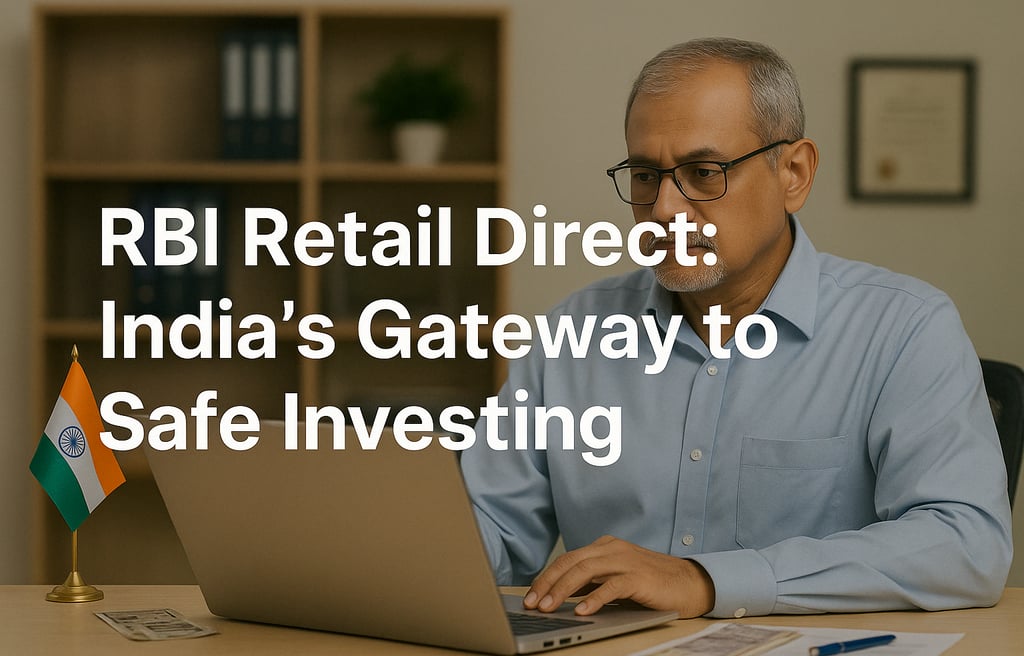RBI Retail Direct Scheme (2025 Guide): How Indian Retail Investors Can Access Government Securities
SD
4/21/20253 min read


RBI Retail Direct Scheme: A New Era for Retail Investors in India (2025 Insight)
The Reserve Bank of India (RBI) has introduced a groundbreaking opportunity for retail investors through the RBI Retail Direct Scheme. With this initiative, individual investors can now access Government Securities (G-Secs) directly, without relying on brokers or mutual funds. Moreover, the platform simplifies investing by offering a seamless and cost-free experience. Consequently, retail investors have the opportunity to diversify their portfolios with government-backed instruments.
Unlocking Government Securities: What is RBI Retail Direct?
Under the RBI Retail Direct Scheme, individuals can open a Retail Direct Gilt (RDG) account directly with the RBI. Through this account, investors are empowered to participate in both the primary auctions and secondary market trading of G-Secs, Treasury Bills (T-Bills), and State Development Loans (SDLs). Furthermore, investors can access Sovereign Gold Bonds (SGBs) easily through the same portal.
Unlike earlier times when institutional access was necessary, now retail investors can independently manage their government securities portfolios. Additionally, for those planning long-term wealth creation, understanding how capital gains tax works in India is crucial for optimizing after-tax returns.
Key Features That Redefine Retail Investing
Several significant features make this platform attractive to a wide range of investors:
Zero Account Charges: Investors can open and maintain their RDG accounts completely free of cost, thereby eliminating financial barriers to entry.
Diverse Investment Options: From short-term treasury bills to long-term sovereign bonds, the scheme provides a broad array of investment choices.
Primary and Secondary Market Access: Not only can investors participate in government auctions, but they can also trade bonds in the secondary market through the NDS-OM portal.
Comprehensive Digital Journey: Registration, bidding, payment, and settlement processes are entirely online, ensuring convenience and transparency.
Nomination and Joint Holdings: Investors can assign nominees or opt for joint holdings, thereby facilitating estate planning.
As a result, the RBI Retail Direct platform offers an unmatched blend of security, ease, and diversity. In addition, those looking to expand their savings efficiently can explore tax-saving investment options to further optimize their portfolios.
How to Open an RBI Retail Direct Account: Step-by-Step Guide
The registration process is straightforward and fully digital:
Visit the official RBI Retail Direct Portal.
Complete the online registration by providing PAN, Aadhaar, mobile number, and bank account details.
Verify identity through e-KYC.
Access the dashboard to start investing immediately.
Since there is no need for physical documents, the onboarding process is quick and efficient.
Why Investors Should Consider RBI Retail Direct
There are multiple compelling reasons to invest through the RBI Retail Direct platform:
Government-Backed Security: Given that G-Secs are sovereign-backed, the credit risk is virtually nonexistent.
Higher Yields Compared to FDs: Investors often enjoy better returns than traditional bank fixed deposits (FDs), especially over longer horizons.
Portfolio Diversification: By adding low-risk government bonds, investors can create more stable and balanced portfolios.
Cost-Efficiency: Without brokerages or hidden fees, investors retain the full benefit of their returns.
Transparency and Control: Direct participation offers greater transparency, empowering investors to make informed decisions.
Consequently, RBI Retail Direct stands as a superior choice for investors seeking security, returns, and autonomy. Additionally, incorporating strategies like investing in international stocks can further diversify and strengthen overall portfolios.
Challenges Investors Must Understand
Although the scheme offers numerous advantages, it is important to recognize potential risks:
Interest Rate Sensitivity: Bond prices are inversely related to interest rate movements. Therefore, investors selling before maturity could incur losses if rates rise.
Liquidity Constraints: Trading volumes in the retail secondary market can vary, thereby impacting exit flexibility.
Learning Curve: Concepts such as yield curves, auction processes, and bond valuation require a certain level of understanding, which new investors must actively develop.
Nevertheless, with careful research and planning, these risks can be effectively managed.
Who Should Invest via RBI Retail Direct?
The platform is particularly well-suited for:
Risk-averse investors seeking steady income.
Retirees aiming to preserve and grow capital safely.
Young professionals diversifying into debt instruments.
Long-term planners targeting predictable cash flows.
By thoughtfully incorporating G-Secs into their strategies, investors can achieve better financial resilience.
Conclusion: A Transformative Step for India’s Investment Landscape
The RBI Retail Direct Scheme signifies much more than just easier access to bonds. It marks the democratization of India’s financial markets, empowering individuals to become direct participants in the nation’s sovereign debt story. With a robust, digital, and cost-efficient platform, the RBI has ensured that every investor—whether novice or experienced—can diversify and strengthen their financial future.
Looking ahead, the RBI Retail Direct platform will continue to play a pivotal role in deepening India’s capital markets. Investors who seek safety, transparency, and direct participation should embrace this opportunity and make government securities a key part of their wealth-building journey.
About One Solution
Quick Links
Contact Info
One Solution — Your trusted partner for financial success.
📍 F17, Grand Plaza, Paltan Bazar
Guwahati, Kamrup (M), Assam
India, Pin: 781008
📞 9650072280
© 2025 One Solution. All Rights Reserved.
